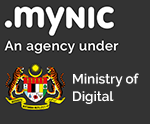Resources
Domains
Learn how to manage and purchase your domain. We are here to help you build your online presence.
Be Our Registrar
At MYNIC, we believe progress is only possible when we work together.
Grow your business with us as Registrar and benefits from direct access to a new customer base, increase in revenues, cross-selling opportunities and friendly technical support – while enjoying rewarding incentives along the way.
Get in touch with our sales team to find out more.











